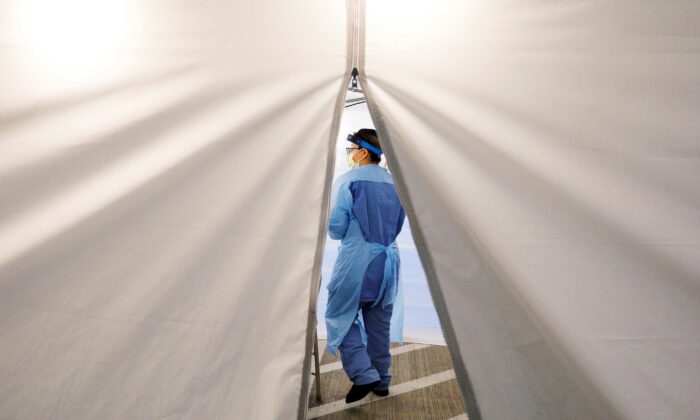To prepare for a potential influx of coronavirus patients, hospitals across the United States are moving to cancel some surgeries and non-urgent care, as the global pandemic spreads nationwide.
The U.S. death toll from the outbreak rose to 65 over the weekend, prompting fears U.S. hospitals will soon be overrun similar to medical centers in Italy, which recorded 368 more deaths from the coronavirus outbreak on Sunday, its biggest one day rise.
As badly impacted countries visibly struggle to cope with the outbreak, U.S. hospitals are making adjustments in preparation for a possible surge of COVID-19 patients. The Wuhan coronavirus, which emerged from China late last year, causes the disease called COVID-19.

The Washington-based GW Medical Faculty Associates, with locations in Washington, Maryland, and Virginia, said on March 15 that “due to COVID-19, we are reducing all elective surgeries this week.”
“As your caregivers, we want to ensure that we are able to meet your needs during the Coronavirus (COVID-19) pandemic. To that end, you will be asked to reschedule appointments so that we are keeping you and others safe, and we are able to meet ongoing and future healthcare needs,” GW Hospital said.
“We will be reaching out to you to reschedule any non-essential appointments,” including physical and annual checks, GW Hospital said, adding that administrators will reevaluate this policy after the week is through.
Besides freeing up capacity for a possible influx of the critically ill, the hospital has taken measures to minimize exposure of its patients and workers to potential infection risk.
“The GW Hospital will be limiting visitors to keep patient population safe and reduce risk of COVID 19 transmission. If you have the following symptoms: shortness of breath, fever, cough, reach out to your provider before coming in,” the hospital added.
Some hospitals have also cut visitation.
Citing “COVID-19 circulating in our community,” the Seattle-based Swedish Medical Center announced last week that it decided to temporarily stop elective inpatient and outpatient surgeries for non-life threatening and non-urgent care, effective March 13.
A day earlier, Swedish suspended all routine visits until further notice.
“Additionally, visitors will not be allowed for patients under evaluation for COVID-19 or who have tested positive. Until COVID-19 no longer poses a public health threat, all patients and visitors will be screened,” the medical center noted.
Providence St. Joseph Health, a hospital system in Washington state that treated the first coronavirus patient in the United States, has also moved forward with a framework to postpone elective surgeries but has not yet made any cancellations.
“We will evaluate on a day-by-day basis if that elective surgery needs to be postponed or if a person will need a skilled nursing placement,” a Providence spokesperson told MarketWatch last week. “Physical capacity and a healthy workforce are two constraints that will need evaluation continuously.”
Other hospitals are directing some categories of patients to use the phone or telemedicine arrangements for some routine care.
Ann Prestipino, an executive at Massachusetts General Hospital, told The Wall Street Journal that starting Monday, the hospital will begin switching all eligible outpatient visits to virtual care and postponing certain surgeries.
“The less people we have to bring or move around our community, the better,” she told the publication.
‘Critical Inflection Point’
The moves to cancel or postpone elective surgeries and related measures come after U.S. Surgeon General Dr. Jerome Adams said it was important to act decisively to contain the outbreak.
“We are at a critical inflection point in this country,” Adams said in an interview with Fox News.
“We are where Italy was two weeks ago in terms of our numbers and we have a choice to make as a nation: Do we want to go the direction of South Korea and really be aggressive and lower our mortality rates or do we want to go the direction of Italy?” he said.
Adams advised hospitals to cancel elective surgeries, warning that every elective surgery could spread coronavirus within a medical center.
He was responding to new recommendations from the American College of Surgeons issued Friday, which urged medical leaders to “thoughtfully review” all their scheduled operations and consider canceling or postponing them “until we have passed the predicted inflection point” in the disease spread.
Among other measures to contain the spread of coronavirus in the United States, many localities are following the recommendation of the U.S. Centers for Disease Control and Prevention against large gatherings for two weeks.
At least 33 states have decided to close public schools, which combined with district closures in other states has shuttered least 64,000 U.S. schools, according to Education Week. At least five states have shuttered bars, with Michigan joining the list on Monday. Other localities have shut down cinemas, theaters, and concert venues.
The White House canceled the annual Easter egg roll on the White House lawn out of an abundance of caution. “The health and safety of all Americans must be the first priority, especially right now,” First Lady Melania Trump said in a statement.
Dr. Anthony Fauci, the top infectious diseases expert in the United States, warned, “The worst is yet ahead for us.”
Reuters contributed to this report.
This article is from the Internet:Hospitals Cancel Elective Surgeries to Prepare for Surge of Coronavirus Patients
Rapid Response COVID-19 Science Conducted by Father-Daughter Virologists
